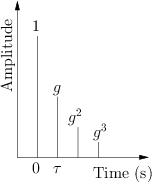What happens when we multiply the output of a delay line
by a gain factor  then feed it back to the input?
then feed it back to the input?
Figure 7:
The signal flow diagram of a comb filter.
 |
The difference equation for this filter is
If the input to the filter is an impulse
the output (impulse response) will be ...
Figure 8:
Impulse response for filter
 , where
, where
 .
.
 |
``Music 206: Introduction to Delay and Filters II''
by Tamara Smyth,
Computing Science, Simon Fraser University.
Download PDF version (filtersDelayII.pdf)
Download compressed PostScript version (filtersDelayII.ps.gz)
Download PDF `4 up' version (filtersDelayII_4up.pdf)
Download compressed PostScript `4 up' version (filtersDelayII_4up.ps.gz)
Copyright © 2019-04-18 by Tamara Smyth.
Please email errata, comments, and suggestions to Tamara Smyth<trsmyth@ucsd.edu>
![]() then feed it back to the input?
then feed it back to the input?